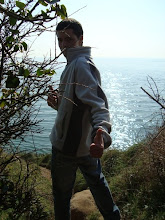Ms Peifer
English 10 IB Hour 5
11/26/08
A Guilty Man
Creon was guilty of overriding the Gods laws with his own insensitive, hastily planned laws. His anger at Polyneices' be trail caused him to create a law that ignored the existing burial rites required by the Gods. He didn't think about the consequences of changing the law and what effects it would have on surviving family members and friends. Therefor, the tragedies that resulted from this new law and the personal suffering that Creon endured because of his actions were justified.
Creon's first mistake was his law about burial rites. Creon talking about Polyneices said, "... he'll have no burial mound, no funeral rites, and no lament. He'll be left unburied, his body there for birds and dogs to eat, a clear reminder of his shameful fate" (Sophocles 233-236). Antigone had also heard of this law. While she was talking to her sister Ismene about the burial, she clearly states that, "He's honouring one with a full funeral and treating the other one disgracefully" (Sophocles 26-27). Antigone is referring to he brothers Eteocles and Polyneices. While he may have been angry at Polyneices for acting out against the country, he had no right to take away Polyneices' burial rites. In fact, it is against the gods law to deny someone burial rites. The Gods law states that one must get the dead body ready for the Hades and the after life. Anyone who goes against the gods laws will be damned for eternity.
Creon was also very self absorbed, he never thought of anyone else but himself. He never considered the consequences of changing the law , the need for mourners to grieve and lovingly take care of the dead or the effect it would have on his family as a whole. When Haemon first enters the palace Creon says, "My son, have you heard the sentence that's been passed upon your bride? And have you now come here angry at your father? Or are you loyal to me, on my side no matter what I do" (Sophocles (716-719). This is quite the biased question. Creon does not care about his sons feelings. Creon only wants to hear Haemon say that he is not angry at him for sending Haemon's fiancé to death. The father, son conversation ends badly and Haemon exits saying, "No. Don't ever hope for that. She'll not die with me just standing there. And as for you your eyes will never see my face again. So let your rage charge on among your friends who want to stand by you in this" (871-875). Shortly after this Haemon killed himself with his own blade just to be with Antigone who had hung herself. Creon's wife had also killed herself because of the death of her son. Creon finally realized what his absurd law had done, however, this realization came to late his family were already dead, and no one can cheat death.
Creon is guilty of the deaths for three very important people. He is also guilty of not obeying the laws of the Gods and placing his own law above the God's which is sin that no one can return from. Creon will be stoned to death, and Hades shall have him with the rest of the damned for eternity.
Work Cited
Sophocles, "Antigone." Sophocles Antigone. Trans. Ian Johnston
09 Aug. 2008 Vancouver Island University 24 Nov. 2008
